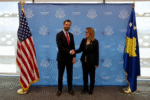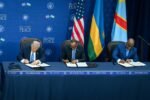PRISHTINA, July 14, 2025 — Senior U.S. State Department official Brendan Hanrahan continued his diplomatic tour of the Western Balkans with high-level meetings in Kosovo on Sunday, as the country grapples with an unresolved institutional crisis and mounting political tensions.
Hanrahan, a top official for European and Eurasian Affairs, met with key political figures including PDK leader Memli Krasniqi, LDK MP Hykmete Bajrami, AAK chairman Ramush Haradinaj, and representatives of the Serbian List party — the main political entity representing Kosovo Serbs.
The meetings focused on the months-long deadlock in the Kosovo Assembly following the February 9 parliamentary elections, as well as ongoing concerns about minority rights and regional security.
Krasniqi: Commitment to Peace and Final Agreement
PDK leader Memli Krasniqi emphasized the importance of reaching a final agreement with Serbia, anchored in mutual recognition. He reiterated his party’s readiness to contribute to political cooperation and stability, while underlining the irreplaceable role of the United States in safeguarding peace in the region.
“We discussed the urgency of a comprehensive agreement between Kosovo and Serbia with mutual recognition at its core, and the vital role of the U.S. in maintaining peace and stability in the Western Balkans,” Krasniqi said.
Bajrami: LDK Proposes Transitional Government
Hykmete Bajrami, representing LDK, expressed serious concern over the deep institutional crisis, referencing the failure to constitute the Assembly since April 15. She presented LDK’s proposal for a transitional government to break the impasse and restore institutional normalcy until the 2026 presidential elections.
“LDK supports solutions that strengthen institutions, preserve democracy, and serve the national interest,” Bajrami stated, reaffirming the party’s opposition to unilateral attempts at governance by any party lacking a clear majority.
Haradinaj: Kosovo’s NATO Aspiration and U.S. Alliance
AAK leader Ramush Haradinaj highlighted the strategic importance of deepening U.S.-Kosovo bilateral ties and reiterated Kosovo’s aspiration to join NATO.
“Our alliance with America is eternal and unbreakable. Kosovo remains firmly committed to strengthening this partnership every single day,” Haradinaj declared.
Lista Serbe: Concern over Institutional Bias
Representatives from the Serbian List expressed concern over what they described as “daily unilateral actions” by institutions in Prishtina, claiming such measures worsen the fragile security situation and violate the rights of the Serbian community. However, they did not cite specific incidents in their statement.
Kurti–Hanrahan Meeting Focuses on Bilateral Cooperation
A day prior, Hanrahan met with Kosovo’s acting Prime Minister Albin Kurti at the U.S. Embassy residence. According to a press release, the leaders discussed bilateral relations and reaffirmed the mutual commitment to strengthening cooperation.
“The United States remains Kosovo’s unwavering ally, and the Republic of Kosovo will always be a reliable partner,” Kurti was quoted as saying.
Assembly Deadlock and Constitutional Uncertainty
The institutional crisis centers on the failure of parliamentary parties to agree on the constitution of the Assembly and the election of a Speaker. Opposition parties — PDK, LDK, AAK, and the Serbian List — have refused to nominate candidates for the secret ballot commission, arguing that the change in voting procedure violates the Constitution.
Meanwhile, the ruling Vetëvendosje movement insists that the vote for its Speaker candidate, Albulena Haxhiu, should be held via secret ballot. Haxhiu has repeatedly failed to secure the required 61 votes in previous open-ballot sessions and is widely viewed as a polarizing figure among the opposition.
Although the Constitutional Court has set July 26 as the final deadline for Assembly constitution, it has not clarified the legal consequences if the deadlock persists beyond that date.
Hanrahan’s regional tour previously included visits to Serbia and Bosnia and Herzegovina. Upon launching his mission, he expressed hope for deepening ties between the U.S. and the Western Balkans, reaffirming America’s role as a stabilizing force in the region.







